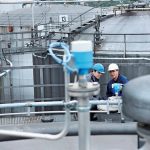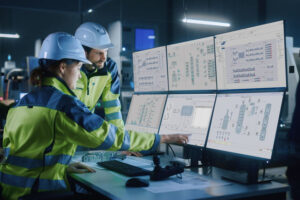Industry 4.0 is the number one topic in German industry today. Factory automation specialists come up with intelligent, communication enabled products, which machine manufacturers use to network their solutions. Yet plant manufacturers, too, are increasingly discovering the benefits of smart technologies. With new modularisation concepts, greater flexibility and digitised field devices, the process industry is also well on the way to Industry 4.0.
Smart technologies on the advance
“Sensors are the senses of Industry 4.0”
Industry 4.0 is the number one topic in German industry today. Factory automation specialists come up with intelligent, communication enabled products, which machine manufacturers use to network their solutions. Yet plant manufacturers, too, are increasingly discovering the benefits of smart technologies. With new modularisation concepts, greater flexibility and digitised field devices, the process industry is also well on the way to Industry 4.0.
Whenever anyone mentions Industry 4.0 and intelligent technologies, we tend to think first and foremost of manufacturing companies and factory automation. It all centres around the interaction between the field, control and management levels. The manufacturing industry anticipates significant productivity gains as a result, particularly from digital enterprises and so-called smart factories. Yet cyber physical systems, digitisation and networked production are also playing an increasingly important role in the process industry. Along with suppliers of measurement systems and process automation solutions, process engineering companies are challenged by the need to manufacture their products even more flexibly while steadily reducing the time to market. Against this background there is a considerable demand for greater flexibility on the production line as well as concepts for modularising processing machines. Intelligent, digitised process sensors are equally vital here, in that they enable information to be collected on the condition of systems and components – indispensable for predictive maintenance, for instance.
Digitisation holds great potential
This is also confirmed by Michael Ziesemer, Chief Operating Officer (COO) of the Endress+Hauser Group: “Digitisation holds great potential for boosting productivity in all branches of industry – and that obviously also includes the process industries. Maintenance and even operation can be optimised by evaluating operating data, for example.” It goes without saying that process sensors are fundamental here. Jumo, the Fulda-based process measurement technology specialist, has already developed a system called Digiline for this purpose. “It consists of intelligent sensors, transmitters and sensor management software”, explains Jens Lang, Jumo’s Manager Development. “The system permits sensors of almost any kind to be connected to each other in a star or tree structure. A single digital signal line is used for communication with the next evaluation unit or controller.” Together with the DSM (Digital Sensor Management) software, this solution enables seamless documentation over the entire lifecycle.
Ziesemer is in no doubt that without sensors everything would grind to a halt. “They’re the senses of Industry 4.0. The data from those umpteen different sensors then has to be got online. Connectivity is the answer. And finally, platforms in the cloud and data analytics are essential in order to turn big data into smart data”, he stresses. Good cyber security concepts have to be established around all of this. At the same time, new business models need to be developed, so that information can be transformed into a service for the customer. “The good news is that you’re not forced to do it all yourself – collaboration is the name of the game”, says Ziesemer. For Dr. Eckhard Roos, Head of KAM and Industry Segment Management PA at Festo in Esslingen, protecting data and assets against unauthorised access is an absolute must whenever production processes are networked and digitised: “After all, the process industry is a very conservative one. Making the economic benefits transparent for users and persuading people to abandon their sundry cherished habits will also be a daunting challenge.” According to Siegfried Schwering, Business Development Manager at Schneider Electric Germany, unified standards will be a prerequisite for achieving this: “Networked production is not totally new in the process industry. There’ll be challenges all the same. One of them will be defining new standards in connection with digitisation and Industry 4.0 in the fields of measurement technology and process automation.” However, he is convinced that the standards in the process industry will differ from those for discrete manufacturing. “The Standardization Council Industrie 4.0 initiative launched by the German Industrie 4.0 platform will be very helpful in this respect. The aim of this initiative is to initiate standards on digital products and to coordinate these standards at national and international level”, he continues.
New system design a must
Networked production in the process industry additionally entails modifying the design of systems. Module based manufacturing is a trend observed by numerous experts, the objective being to shorten the time to market. Yet what lies behind the modularisation of processing machines and how does it fit into the context of networked production? Festo manager Roos sheds light: “Several standardised processing modules are put together to form a complete production facility. The automation of these modules then takes place in the modules themselves.” All information relating to visualisation requirements, for instance, is made available to a higher-level system by the modules. This happens largely automatically, so that only minimal engineering is necessary to integrate the modules in the higher-level system. To Roos, this has obvious advantages: “Modular systems enable more flexible production. Existing assets can be converted to new products very efficiently simply by exchanging modules and the markets can be supplied straight away.” The underlying principle of this automation concept is that the automation functions are converted locally, in other words actually in the modules. “With conventional automation it wouldn’t be possible to swap the modules that quickly”, he emphasises. Schwering, the Schneider Electric expert, believes that modularisation concepts can be realised particularly effectively in small to medium-sized processing machines, offering a whole series of benefits: “By using predefined standard modules for the production processes, the system as a whole can be built faster and more flexibly. The ability to network the relevant modules using defined standards is a core feature.” Depending on the definition, it would be perfectly possible for a module to be designed, or classed as, a cyber physical system (CPS) in line with Industry 4.0. Experts at Namur – the User Association of Automation Technology in Process Industries – are also adamant that any company for which speed to market is a top priority should consider investing in a modular system. The F³ Factory approach by Invite, a research centre in Leverkusen, is a good example here. F³ Factory (fast, flexible, future) is an EU funded project under the Seventh Framework Programme which is focused on the development and implementation of a standardised, modular production plant for the chemical industry. The goal is to combine the advantages of flexible but inefficient batch manufacturing with the cost benefits of continuous production in the form of small to medium-scale container plants. This will hopefully provide the European chemical industry with the means to manufacture in a more environmentally friendly way making more efficient use of resources. Michael Ziesemer is rather more sceptical about modularisation. “Modularisation is a key trend among our customers”, he admits, “but it’s not the only one”. As he sees it, customers’ needs change and that’s why flexibility is called for. “Numbering-up” instead of “scale-up” is the motto for this modular production concept. “I don’t think modularisation is the right concept for the cracker, though, or for the production of olefins, even if networking and digitisation are also high on the agenda there. That’s the overlying trend”, Ziesemer claims. “Modularisation is a sub-trend for industry segments.”
“The automation must follow the process technology”, he affirms. “No matter how important it is, it’s always there to serve the process. In any modular production concept, therefore, the automation technology must be designed to match.” This begins with the mechanical components, the process connections and the sizing. It continues with new concepts for explosion protection and last but not least the huge world of connectivity and data storage. Ziesemer: “The consistency of the engineering data alone – from feed to maintenance – provides massive potential for cost savings.”
Trend towards networked systems
Other experts are in agreement concerning the clear overlying trend towards networked systems. This is noticeable as early as the system planning stage, where “integrated engi-neering” is the method of choice. And it is not without reason that industry leader Siemens has selected this approach as its motto: The digital plant – from Integrated Engineering to Integrated Operation: “Ingenuity for life”. According to Dr. Jürgen Brandes, CEO of the Process Industries and Drives Division, integrated engineering firstly has to do with increased productivity and flexibility – in other words, aspects such as cloud-capable services and analytics, reliable connectivity, the next generation of control systems and the digitisation of the field level. Secondly, optimised engineering and lifecycle management are paramount. “We’re talking here about integrated engineering tools, simulation and a shared data model”, says Brandes. “It doesn’t just make sense to get started with digital systems when planning a new investment. Standardisation, flexibility and efficient asset and maintenance management are also utterly essential for existing facilities if you want to stay competitive and get fit for the future.” The Nuremberg firm have responded with a special portfolio that guides users step by step to their own digital plant. It consists of integrated software solutions, reliable high-speed communication networks, data security, smart services for evaluating the data which is generated and industry-specific process know-how as well as modern drive and automation technology. Automation specialist Festo is likewise endeavouring to optimise engineering and lifecycle management while at the same time boosting plant productivity and flexibility. “Festo is a member of the ZVEI/Namur working group (ZVEI is the German Electrical and Electronic Manufacturers’ Association), which is helping to develop a non-proprietary, open industry standard with the broad participation of German users and manufacturers”, explains Roos. “This is imperative for the concept to be implemented successfully.” The first steps in this direction in the field of water treatment plants are highly promising.
Demand for distributed automation
New automation concepts are consequently a critical success factor. Companies in the process industry increasingly expect the automation technology to provide suitable process control systems (PLC) to meet the demands of networked production and modular process design. “Traditional PLCs will decline in impor-tance as a result of distributed automation concepts and standardised communications within these solutions”, alleges Festo’s Dr. Roos. He predicts that new players will enter this market and take over parts of it – not only in the module automation segment itself but also in visualisation and process monitoring. On the other hand, Siegfried Schwering, his colleague from Schneider Electric, is of the opinion that a crucial role will be played by the process control systems of existing assets. “These could become the interface to the Industry 4.0 strategy and architecture, provided they meet certain conditions. Compatibility with Industry 4.0 is established with the help of so-called ‘administration shells’. These shells are virtually wrapped around the existing plant components, turning them into Industry-4.0-compliant units”, he points out. They are then saved and managed in a database, which is usually already available in the process control system. And Endress+Hauser COO Ziesemer maintains that classic control systems will soon be a thing of the past. “Contemporary field technology with sensors and actuators is in any case very intelligent and will form part of the Internet of Things. The IT, including the ERP and MES systems, is interfacing with the field technology. Of course, open and closed-loop control still have to take place in real time, but the classic PCS is on its way out in this architecture.” Endress+Hauser feels ready to confront this development. In the meantime, it has recorded specific information on more than 28 million field devices in a “Common Equipment Record”. This information can be accessed by customers online. The company also has plenty of know-how when it comes to business process integration, which involves integrating measured values and device data into ERP systems, where it is processed automatically.
On the way to Industry 4.0
Modular production plants are already used for productive purposes today, especially in the chemical and pharmaceutical industries. Chengdu Rongsheng Pharmaceutical, the Chinese pharmaceutical company, has upgraded its processes with a manufacturing execution system supplied by Siemens, for instance. Since switching to an ultra-modern, electronic batch documentation system, Chengdu’s blood plasma production facility has worked more stably and more efficiently. Thus, to a certain extent, digitisation and networked production are a reality even now. In short, the process industry is already well on the way to Industry 4.0.
Johannes Gillar
Johannes Gillar
Journalist
Share:










